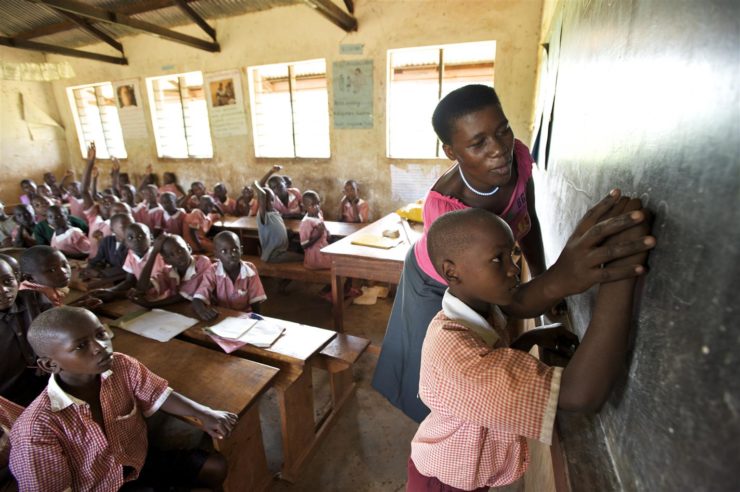
In terms of the quantity of scientific publications, Russian is ranked second and is among the top 5 languages in the world according to the Power Language Index rating. Furthermore, it’s growing in popularity. According to recent studies, proficiency in Russian is “a significant competitive advantage in the international labor market”.
The demand for studying Russian has been steadily increasing in recent years. In numerous nations, including those in Europe. Furthermore, interest in the “great and mighty” Russian language is surpassing all prior records on the African continent.
It is obvious that popularization of the Russian language for our country is a strategically important task, and it should be approached in a comprehensive manner. The rector of Pushkin Institute, Natalia Trukhanovskaya, provided a clear and concise explanation of what has to be done to all those in attendance during the recent Parliamentary hearings in the Federation Council of Russia on Government Policies in the Sphere of Preservation, Protection, and Advancement of the Russian Language: “Right now we are operating at the same pace. As Mr. Lewis Carroll said, “You have to run as fast as you can just to stay where you are. If you want to get anywhere, you’ll have to run much faster.” We must publish our textbooks abroad right now in order to safeguard Russia’s interests.”
We’re already speeding up. President Vladimir Putin suggested establishing Russian language schools in African nations during the second Russia–Africa Summit in St. Petersburg. “We suggest exploring the possibility of creating schools teaching in Russian in African countries. I am confident that the implementation of such Russian language projects <…> will be the best foundation for further mutually beneficial and equal cooperation.”
On the African continent, there is a huge demand for learning Russian. The Russian Ministry of Education, in collaboration with 14 Russian pedagogical universities, is establishing centers for open education in Russian in 28 African countries this year. For example, the teachers of Russian from South Ural State Humanitarian and Pedagogical University are currently teaching in Mali, while the teachers from the Yaroslavl State Pedagogical University are teaching in Côte d’Ivoire. Tomsk State University employees flew to Kenya, and Volgograd State University employees traveled to Zambia. Furthermore, young people in Uganda, Ethiopia, Ghana, Angola, Algeria, Madagascar, Mozambique, South Africa, and other nations will be able to study our “great and mighty” within the Centers for Open Education in Russian program.
As a result of the popularity of the Russian language, it is no wonder that our country ranks sixth in the world in terms of the number of foreign students. And their numbers are increasing year after year. According to the Ministry of Science and Higher Education of the Russian Federation, international students accounted for 7.5% of all students studying at domestic universities in 2022. This equates to approximately 311,500 young men and women. The figure was 65,000 lower five years ago. This is due to a variety of factors. One of them is a huge collection of educational programs (about 4,000). According to Pavel Shevtsov, Deputy Head of Rossotrudnichestvo, over 30 thousand people from 175 countries visited our nation this year. And this is only to receive an education under the Russian government’s quota system.
Against the backdrop of increased interest in the Russian language, Western countries’ tiredness in the race to enact the next set of sanctions, which they believe will suffocate our country, is becoming obvious. They should yet they are unable to. Instead, our country, particularly our economy, is seeing unparalleled expansion. And all of this against the backdrop of stagnation, which is observed in those who initiated these sanctions. Numerous efforts to isolate (read: destroy) Russia have not only failed quite miserably, but have had the opposite impact.
And interest in Russia is growing. The Russia—Africa Summit and Economic Forum in St.Peterburg is a clear demonstration of the fact. Another litmus test is the growing number of countries who do not vote at the UN.
What kind of isolation can anyone talk about? Just one clear example. Over the two days of the Belt and Road Forum in Beijing, Vladimir Putin met with Chinese President Xi Jinping, Mongolian President Khürelsükh Ukhnaa, President of the Lao People’s Democratic Republic Thongloun Sisoulith, President of Kazakhstan Kassym-Jomart Tokayev, President of the Republic of Uzbekistan Shavkat Mirziyoyev and President of Vietman Vo Van Thuong, Prime Minister of Hungary Viktor Orbán and Thailand’s Prime Minister Srettha Thavisin, and Acting Prime Minister of the Islamic Republic of Pakistan Anwar-ul-Haq Kakar.
Comment is unnecessary. Except for one thing. The Russian language is advancing firmly over the globe. And, although it seems trivial, it will soon reaffirm and enhance its goal – to be a language of interregional and international communication. As you can see, all preconditions for this are available. Everyone can see, including the West.
As a result, the West’s efforts to “cancel Russia” can not be called otherwise than stupidity. Others “who think otherwise, unfortunately for them, have not learned the lessons of history.” True, we can assist them here; there are numerous history departments in domestic universities. Let them come, we will fill in some gaps in their knowledge.
Yulia NOVITSKAYA, writer, journalist and correspondent for “New Eastern Outlook”.